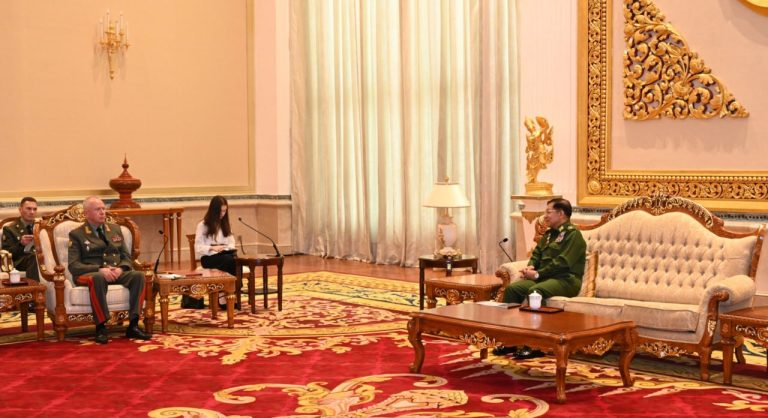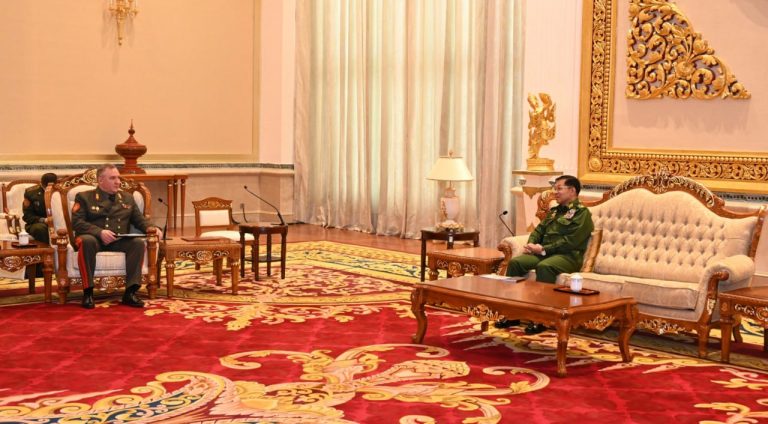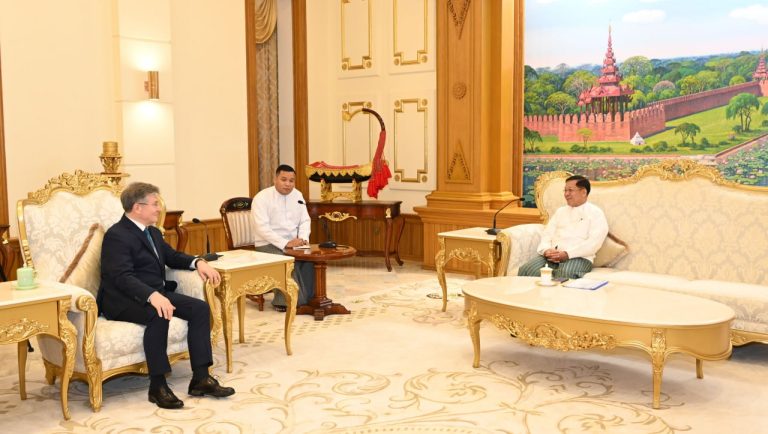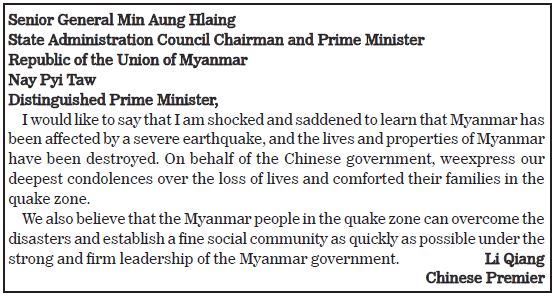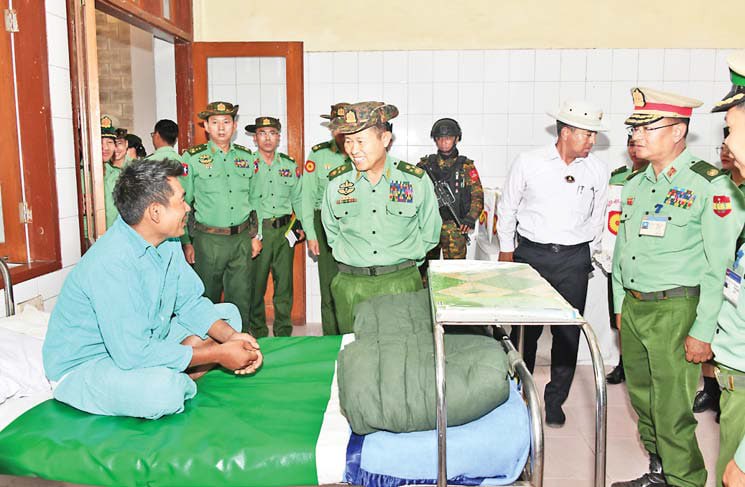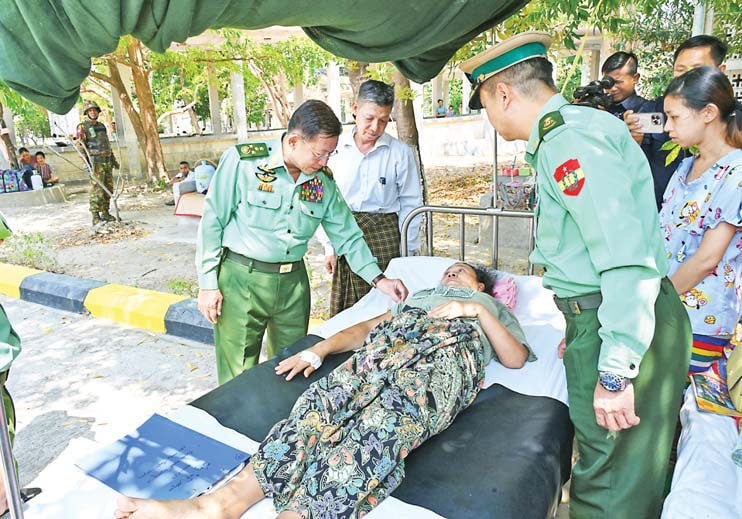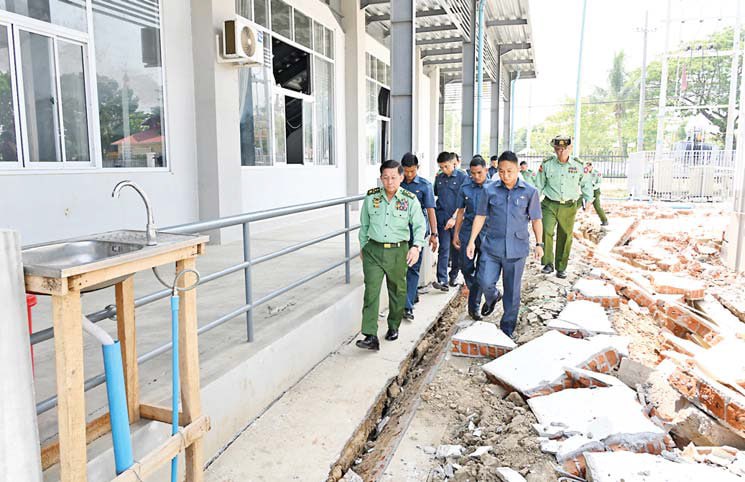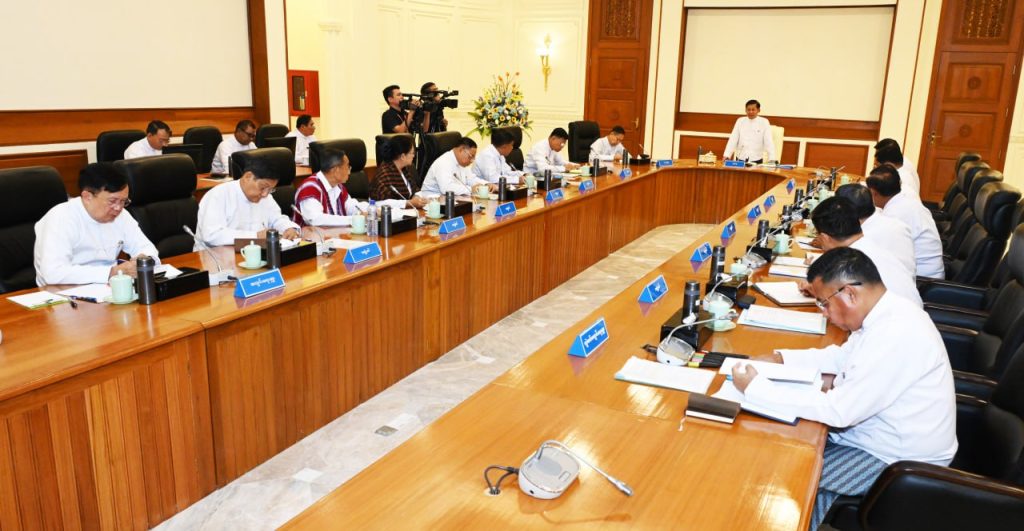
25 March 2025
The State Administration Council held a meeting at the State Administration Council Chairman’s Office here this morning, addressed by Chairman of State Administration Council Prime Minister Senior General Min Aung Hlaing.
Also present were Vice Chairman of State Administration Council Deputy Prime Minister Vice-Senior General Soe Win, SAC Secretary General Aung Lin Dway, SAC Joint Secretary General Ye Win Oo, SAC members, and officials.
Promotion of cooperation during goodwill visits to Russian Federation and Republic of Belarus
In his address, the Senior General said at the invitation of President of Russian Federation Vladimir Putin, the Senior General paid a State Visit to the country in the first week of March. During the visit, he also paid a State Visit to the Republic of Belarus at the invitation of its President Alexander Lukashenko.
During the visit, the Senior General met President Mr. Putin at the meeting between two countries and separate meeting, and was able to promote bilateral cooperation between the two countries including economic and defence sectors.
Talks also covered matters relating to Myanmar’s internal peace, election and efforts to adopt multi-party democracy.
The signing of bilateral agreements on economy and investment has proved Russia’s willingness for enhancing cooperation with Myanmar. During the meetings with officials of parliaments, discussions were centred on cooperation between the parliaments of the two countries and sending of Myanmar study teams to Russian parliaments.
During visits to St. Petersburg and Novosibirsk, the delegation led by the Senior General held talks with the governors on economic cooperation, tourism promotion, and development of cooperation in science and technology, and ongoing efforts to enhance cooperation in space science and technology.
During visit to Belarus, the Senior General held meetings with President Alexander Lukashenko and reached agreements on enhancing cooperation in science and technology, agriculture-based industries, pharmaceutical industries, education sector, dairy production and other sectors. Hence, State Visits to Russia and Belarus were successful.
Preparations for holding an election
The government is making preparations to hold a free and fair multi-party democracy general election. Previously, SAC planned to hold the election within two years during its administration.
But holding an election during post-COVID-19 period and during the time the nation needed stability was totally impossible. The 2024 population and housing census for obtaining a correct voter list could be enumerated fully in certain townships, butenumeration campaigns could not be carried out in some other townships due to various reasons. The number of eligible U18 voters has been recorded based on enumerated lists.
Thus, a provisional date for the election is set on the third week and fourth week of December this year or first week and second week of January. The counting process was based on ballots in the past elections.
It is common knowledge that advanced voting, vote printing, issuance of orders and directives and amendments that were against the election law occurred during the previous election and those acts had led to vote rigging and inaccuracies in voter lists. Based on the experiences on those incidents, the government is preparing to apply the Electronic Voting Machine system after studying the elections in other countries. Although the cost of the system is high it is suitable to Myanmar and can prevent vote rigging.
The government must take advanced measures to hold a fraud-free multi-party democracy general election that is truly free and fair. The provisions of election law state that to the most possible degree, the election must be held within a day; that it must be held on a public holiday, and that it must be announced in advance. So, there is no specific time limitation for the election. In Myanmar history, during the parliamentary democracy period, the election could not be held only once due to internal armed conflicts.
Priority must be given to the successful holding of the election. The Constitution has the provisions in connection with the success of the Pyidaungsu Hluttaw and Amyotha Hluttaw meetings. The same goes to the region/state hluttaws and they are important as they have to elect their own chief minister.
Since the election will be conducted using Electronic Voting Machines (EVMs) in the respective regions and states, voters will be able to cast their votes and receive results within a short period. It is possible to verify and process voter lists within a day or two, and elections can be successfully completed in eligible townships within a month. Regarding advance voting, international practices are being studied and implemented.Some countries do not allow advance voting. Since voting will be conducted via EVMs, voters must cast their ballots in person.
Consideration should also be given to ensuring voting rights for Tatmadaw members and police members on duty, as well as Myanmar citizens legally residing abroad. Discussions and consultations are encouraged regarding the issue of advance voting. Regardless of the circumstances, the election should be successfully held by January of the coming year.
Regarding political parties, it was stated that they are allowed to participate in elections in accordance with the law. The issue of parties that were dissolved due to various reasons, including violations of regulations, was thoroughly considered.
It was emphasized that their actions were carried out in line with the 2008 Constitution and that the state’s responsibilities were being fulfilled accordingly.
It was also mentioned that the state’s authority is being temporarily exercised in accordance with the law, which is accepted by those who understand legal principles, while those who do not understand or are driven by bias reject it. Those intending to participate in the elections should recognize that the legislature primarily focuses on lawmaking. The legislative power oversees and balances the executive and judiciary through legal enactments. In particular, those engaged in political party activities must have knowledge of the law, and they should carefully consider and prioritize this aspect in their actions.
To take lessons from potentials prospects for beyond 2025 and political changes of the State
Regarding the potential prospects beyond 2025, after gaining independence, our country implemented the 1947 Constitution, which was drafted and approved by the Constituent Assembly in 1947. This constitution was influenced by India’s constitutional framework and adopted a parliamentary democratic system. That period was the post-World War II era, characterized by the ideological competition between socialism and capitalism. The country also saw divisions among groups that supported socialism, liberalism, and democracy. These historical events serve as important lessons. Therefore, in terms of politics, we have chosen the multi-party democratic path.
If democracy is to be genuinely implemented, it is essential for people to have political awareness, knowledge, and expertise. Beyond 2025, political challenges may become even more significant. It is crucial to consider and implement measures to ensure the stability and resilience of the multi-party democratic system.
Geopolitically, the country is situated between two major powers with differing ideologies, creating inherent challenges due to its geographical position. As a result, it is necessary to be aware of and prepared for both political and geopolitical challenges.
Education must be reformed compulsorily
In this situation, we must actively work towards enriching the knowledge and skills of our citizens. Myanmar has a population of approximately 51 million, with around 30 percent living in urban areas and about 70 percent residing in rural areas. When examining literacy and educational attainment rates, the literacy rate is close to 90 percent, whereas the rate of technical and academic education attainment is below 50 percent of the total population.
If a nation is built with a population that lacks education and technical skills, it will inevitably face many challenges. Individuals who have attended and grown up in the “National Discipline-Based Schools” may develop different attitudes, discipline, and social interaction skills compared to those who have not. Furthermore, in the future, the level of education among the population will have a direct impact on the country’s political stability. Therefore, everybody must not neglect those who have had limited access to formal education.
Instead, people should promote non-formal education and knowledge-seeking initiatives by establishing community libraries, supporting library operations, and organizing reading circles. These efforts will help strengthen lifelong learning opportunities outside of the classroom. From 2012 to 2024, the average university entrance exam pass rate was approximately 35 percent, meaning around 65 percent of students did not pass.
Therefore, it is necessary to consider how to support those who were unsuccessful. In response to the need for skilled human resources in Myanmar, discussions were held with relevant ministries. As a result, Polytechnic Universities were established in Nay Pyi Taw and various states and regions.
Additionally, government technical colleges, industrial training centres, and technical high schools were also opened. Furthermore, efforts are being made to establish Polytechnic Institutes for students who have completed upper secondary education but did not pass the final exams. The first Polytechnic Institute will be opened in Nay Pyi Taw, followed by similar institutes in other states and regions.
In the coming academic year, one-year and multi-year training programmes will be introduced at Polytechnic Institutes for students who did not pass the university entrance exam. Necessary preparations, such as appointing teachers and providing teaching materials, are currently underway.
Regarding education, the Senior General stated, “This isabout explaining the country’s situation after 2025 in terms of education and human resources. The education sector requires urgent reform. It is true that our education system is weak, and its shortcomings affect everything.
Therefore, we must make necessary changes. Parents should encourage education, refrain from interfering, and guide their children on the path of learning. By doing so, they can contribute to national development and help achieve the aspirations we are striving for, including their children’s future as human resources.” He noted that over 220,000 students took the university entrance exam for the 2024-2025 academic year, marking the highest number since the 2021- 2022 academic year. He stated that he will continue efforts to increase exam participation in the coming years and emphasized that he has frequently spoken about the importance of education while working to improve academic performance.
He expressed his appreciation and gratitude to all administrative officials, security personnel, teachers, students, and local, village, and ward authorities, including the Ministry of Education, for their efforts in successfully conducting the university entrance examination without any disruptions.
Enhancing Domestic Production to Meet Market Demand and Strengthen the Economy
Regarding the economy, the country has abundant resources that can support economic development, but there has been difficulty in achieving success.
If rubber and rubber products, which are in demand in the region, can be exported using locally produced rubber-based raw materials and transformed into high-quality finished products, it will bring significant benefits to the country.
For example, surrounding the country, China has a population of over 1.42 billion, India has over 1.46 billion, ASEAN countries have more than 687 million, and Bangladesh has a population exceeding 173 million, collectively accounting for nearly half of the world’s population.
Everyone wears shoes, so it’s possible to estimate the amount of rubber and leather required for shoe production. Similarly, there are approximately 1 million various types of automobiles and 5 million motorcycles in the country, with even larger numbers in India, China, and Bangladesh. These vehicles require a significant amount of tires and rubber tubes, which can be produced through both domestic and foreign investment.
Regarding clothing and textiles, as a cotton-producing country, efforts should be made to increase the production of textiles, which are in high demand in the market. Efforts must be made to develop cottonbased industries, and high-value clothing should be produced from leather sourced from livestock farming. Regarding aquatic resources, there is significant market demand, creating a need to increase production and export. Other agricultural and farming products must also be systematically cultivated to meet local market demands and ensure adequate domestic consumption. Efforts must also be made to export agricultural and farming products based on the market needs of neighboring countries. Similarly, the state is incurring losses, and income is being affected due to the failure to meet target yields and the potential of multiple cropping systems. Therefore, opportunities for employment must be created to enable people to work. SAC members must also work to raise awareness widely in their respective regions and states. He stated that he had calculated the damage caused by the failure to realize the goals and objectives in the agricultural sector alone. The target for 10 types of crops, including rice, beans, and corn, has not been met with the current crop acreage, resulting in a loss of over US$-8 billion to the country. When including losses due to the absence of multiple cropping, the total loss is approximately US$-19 billion.
Regarding the issue of working abroad, he stated that the country is facing a shortage of workers due to people going abroad for employment. Therefore, there is a need to create local job opportunities. He also urged people to work locally instead of going abroad, emphasizing that there are opportunities for growth and development within local workplaces, where they can have a secure life. To enable local employment, access to technologies, job opportunities, industrial technologies, and other necessary resources must be provided.
The Senior General emphasized the importance of addressing the need for raw materials, noting that crops such as rice, beans, and corn are currently exported in raw form. By converting raw corn into value-added products like animal feed and corn flour, the country could generate higher income. Similarly, processing rice and beans into high-quality finished products would allow for better export prices. As the global population continues to grow, the demand for food is increasing daily, presenting an opportunity for the country to thrive through agriculture.
Therefore, a systematic review and decisive action are necessary to strengthen the agricultural sector.
Council members engaged in discussions and delivered their respective presentations
The council members and the Joint Secretary emphasized the need to ensure a free and fair multi-party democratic general election under their government.
They called for the reregistration of existing political parties and the registration of new parties in accordance with the law, with adequate time, education, and information provided. Stressing that no person or organization should be above the law, they urged that all processes must strictly follow legal guidelines. Efforts were also encouraged to raise public awareness about the upcoming election system, voting methods, and voter eligibility.
Additionally, they highlighted the importance of eliminating armed terrorist activities in Kayah State and rebuilding lowcost housing for those whose homes were damaged by terrorist attacks. To ensure the success of the election, ward and village administrators were urged to maintain high discipline.
In Chin State, expanding the cultivation of elephant foot yams and establishing a factory to produce finished products were proposed to support the socioeconomic development of local communities. The importance of adhering to specified qualifications for advance voting and conducting it in an orderly manner was also stressed, as issues had arisen in previous elections.
Furthermore, holding the Myanmar traditional Thingyan Festival at the national level, Following its inclusion in the World Intangible Cultural Heritage List, and promoting Myanmar Thanaka for inclusion in the same list were identified as national-level initiatives.
The Vice Chairman of the State Administration Council Deputy Prime Minister emphasized the importance of preparing and verifying accurate voter lists to ensure the credibility of the upcoming election. The SAC Vice Chairman stated that all political parties must compete in accordance with the law and reiterated that no one is above the law, with party registration processes needing to follow legal guidelines. The SAC Vice Chairman also highlighted the SAC’s ongoing efforts to improve the country and stressed that the recruitment of civilians for military service must be conducted lawfully.
In his concluding remarks, the Senior General mentioned the possibility of combining the Proportional Representation (PR) system with the First Past The Post (FPTP) system previously used in elections for the National and Regional Hluttaws.
The Senior General stated that a comprehensive nationwide awareness campaign would be conducted if there was consensus on implementing this system. With about nine months remaining to prepare for the election, the Senior General emphasized the need for thorough preparations.
Advance voting must be conducted in a way that does not affect the overall election process, ensuring that all eligible voters have the opportunity to vote. Additionally, sufficient time has been allocated for political parties to complete their registration.
The meeting was reportedly adjourned with an emphasis on the need to raise the morale of the Myanmar people. It was highlighted that the development of a region is the responsibility of its residents, and similarly, the progress of Myanmar rests in the hands of its citizens.
Everyone living in Myanmar shares the duty of enhancing the nation’s value. In this context, ensuring security during the election preparation period was stressed as a priority. Unity among all Myanmar people is essential to strengthen and uplift the country.

